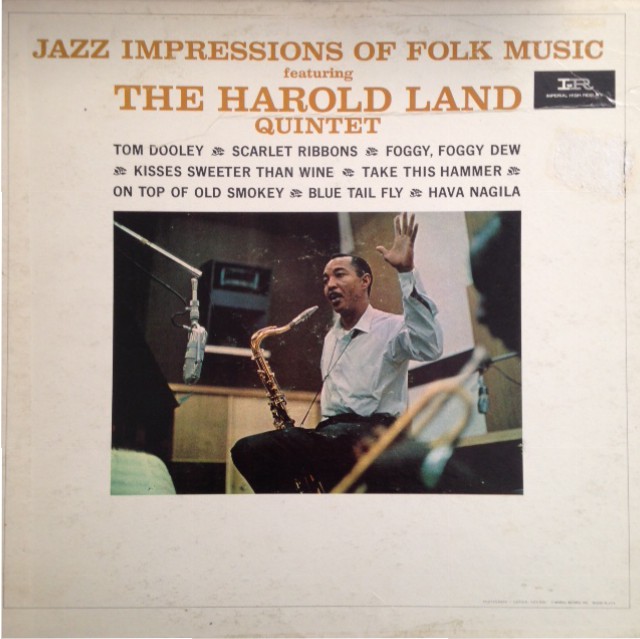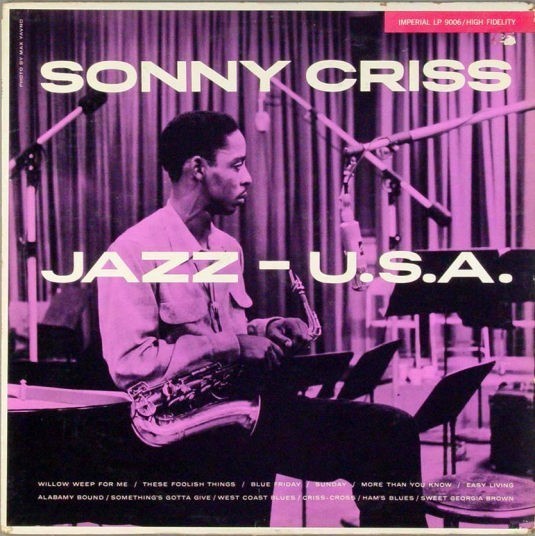Get acquinted with Jazz Impressions Of Folk Music, the underappreciated gem in the discography of tenor saxophonist Harold Land.
Personnel
Harold Land (tenor saxophone), Carmell Jones (trumpet), John Houston (piano), Jimmy Bond (bass), Mel Lee (drums)
Recorded
on July 3 & 17 at Radio Recorders, Los Angeles
Released
as Imperial 12247 in 1963
Track listing
Side A:
Tom Dooley
Scarlet Ribbons
Foggy, Foggy Dew
Kisses Sweeter Than Wine
Side B:
On Top Of Old Smokey
Take This Hammer
Hava Nagila
Blue Tail Fly
We love Harold Land, one of the finest tenor saxophonists of his generation, who fills the void between Rollins and Mobley. He employs a hard but clean tone and is rarely short on ideas. His fluent playing makes it feel as if the changes do not exist. Taste written all over Mr. Land, who loves chili pepper, goes easy on salt. Land came into his own just before Charlie Parker passed away early in 1955, the era of the burgeoning hard bop style, when the tenorist from Houston, Texas was part of the Clifford Brown/Max Roach Quintet, partaking in the making of the group’s essential albums. His stint with the challenging, popular outfit sealed Land’s reputation as a major voice on the tenor saxophone.
Land spent a large part of his career on the West Coast, where he recorded the eponymous The Fox with trumpeter Dupree Bolton and pianist Elmo Hope. He enjoyed a fruitful cooperation with vibraphonist Bobby Hutcherson on a string of Blue Note albums in the late 60s and early 70s. A number of albums by Land, who passed away in 2001, are popular items, particularly West Coast Blues – with guitarist Wes Montgomery – and The Peacemaker.
Jazz Impressions Of Folk Music owns its rightful place in that category. Folk music? Sure, why not. The folk boom was at its height in the mid-sixties, Pete Seeger a working class hero, Seeger’s former copycat Bob Dylan was making a big name for himself, folkies flocked the streets of Greenwich Village. Jazz jumped on the bandwagon. Even big names like Duke Ellington did Blowin’ In The Wind. The great Bud Shank dug in too, on his Folk Flute album, a forgettable commercial affair, by the way. But jazz interpretations of folk tunes weren’t always specifically designed to try to cash in. Sonny Rollins famously posed as an old cowhand and recorded Way Out West in 1957, one of the prime examples of the transformative potential of jazz. A couple of albums that were released during the era of Land’s album were Art Farmer’s To Sweden With Love, Clifford Jordan’s Plays Leadbelly and Shelly Manne’s My Son The Drummer, a set of Jewish and Hebrew songs. Good company.
Land chose a bit of everything, sneaking into the skin of cowboy, Hebrew cat and John Henry. The repertoire consists of Tom Dooley, Scarlet Ribbons, Foggy, Foggy Dew, Kisses Sweeter Than Wine, On Top Of Old Smokey, Take This Hammer, Hava Nagila and Blue Tail Fly. It’s consistently excellent. The frontline sparkles with warm unison melodies and spontaneous ad-libs. The underrated Carmell Jones, a trumpeter with a shiny full tone, delicately using slurs and bends, rides on the waves of a solid rhythm trio, that moves with ease and urgent swing and responds merrily to Land and Jones, who secretly pass canned heat to one another in a smoke-filled corner of the saloon. Pianist John Houston adds a number of nimble, lively lines.
The story of Land’s Tom Dooley is a rare thing of beauty. The warmth and fluidity of Land’s playing not only pervades that opening tune, but the entire program of his sincere jazz folk album.
Jazz Impressions Of Folk Music is unfortunately not released on CD or streamed as yet, but it is part of The Mosaic Select set of Carmell Jones. Find (here).
Listen to Kisses Sweeter Than Wine on YouTube (here).



